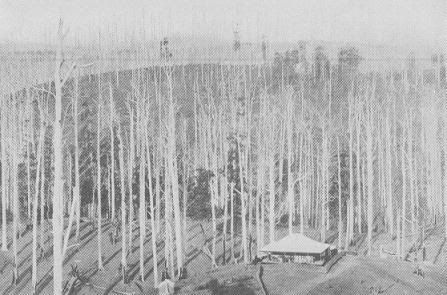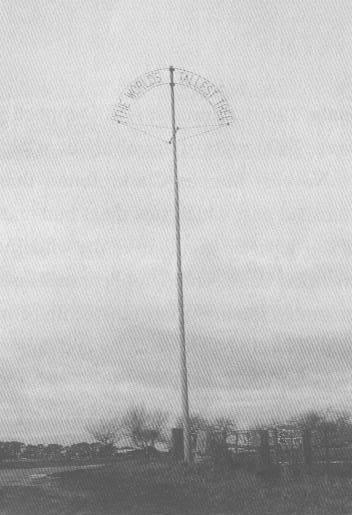Bonang
| Bonang | ||||||||||
|---|---|---|---|---|---|---|---|---|---|---|

See under "Football" for the significance of the two balls in the city flag. | ||||||||||
|
Setting
Bonang is the nation’s largest city yet tends to be treated with some derision by other Errinundrians. Lying on the northern plains it has no geographical feature to distinguish it. Once forested like the great central plateau, the northern plains were extensively "improved", between the 1889 civil war and the 1941 liberation. This was straight out slashing and burning and did not even utilise the timber. Vast tracts of land were covered in the dead stags of once proud trees: fuel awaiting a firestorm which duly arrived in 1898.

A northern homestead shortly before the 1898 fires.
Clear-felling continued after the liberation due to a clever legal exploition of a quirk in the constitution that gave the notorious NGDV Ltd unexpected rights over the plains. The collapse of this loathed company some years ago brought an end to the logging, however the cleared land was never re-forested. Instead, the fertile soils feed the nation and fuel the growth of the great northern cities, Bendoc, Bonang, Deddick, Delegate and Tubbut.

Attitudes
With the wealth from the logging and farming, Bonang has grown to be the financial hub of Errinundera, something that is resented by the “old” money of McKillops Bridge. The rivalry between these two cities is intense. Errinundrians from the Snowy River valley and from the central plateau look down their noses at the plains people as comparatively materialistic (by Errinundera’s unworldly standards), provincial, uncultured and a bit dense. This doesn’t seem to worry the Plains Folk as they are smug in the knowledge that they are more practical, harder-working, wealthier (by Errinundera’s very low standards) and more, well, normal.
Bonang came into minor prominence during World Cup 6, when fans, incensed by taunting from Lemmitanian radio broadcasters during the semi-final, trashed the local lammington factory (see corporate torching and news media archive CUP RIOTS CAUSE CAKE SHORTAGE). Two things can be observed from this. One: Bonangers can be as weird as any Errinundrians. Two: Perhaps their reputation as being rustic and a bit thick has some basis although their parody of the forest folk's sacred trees is typical Errinundrian irony.
Football
The thing that people always remember when you put the two words, “Bonang” and “football” together in a conversation is the nickname of the city’s team – the Gonads. When the club started as some yobbos’ excuse for a weekend piss-up they gave themselves the alliterative and ribald monicker, not realizing the big strides the club would make. When later, more particular, club officials tried to change the name the fans ignored them and continued to use the name on their banners, scarves and jumpers. At an official launch of a sponsored new name – The Wombats - irate fans set firehoses on the officials and sponsors. So, reluctantly, the traditional name was formally accepted as the name of the city’s team: the Bonang Gonads.
So confident were the Gonads in their footballing future that they built the largest stadium in the nation, the 101,000 seat Bonang Cricket Ground. It is the premier sporting venue in the nation, hosting test cricket as well as Nation States World Cup qualifying matches.
